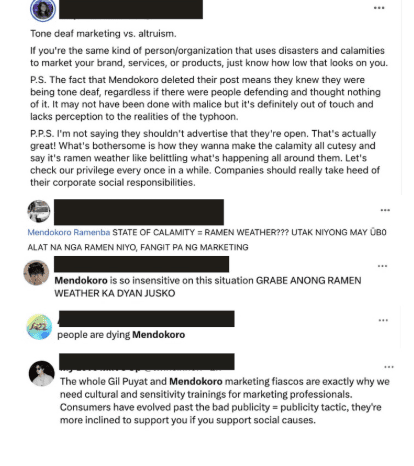From July 19 to July 29, 2024, Super Typhoon Carina (known internationally as “Gaemi”) struck the Philippines with widespread flooding and devastation. It left a death toll of 39 people and thousands of people stranded in rain and floodwater.
Amidst all of the disaster, Mendokoro Ramenba made a post that went viral…for all the wrong reasons.
In a deleted post, the ramen joint invited customers to “wait out the storm” with hot ramen, dubbing it “perfect ramen weather.”
The backlash was immediate and intense. Critics called the post “insensitive,” “disgusting,” and “beyond inappropriate.”

(picture of responses, from Pop Inquirer.net)
Mendokoro eventually issued an apology, but the damage was done. The ramen place even became a cautionary tale to PR agencies in the country.
Learning from Mendokoro
I think it goes without saying that all brands should read the room every once in a while. From a business perspective, I’ll be that person: in a crisis, brand messaging mistakes are costly. Empathy must lead every message.
And nobody can avoid uncertainty, either. It’s a constant in business, be it from extreme weather, political instability, or economic swings.
For brands, the real challenge isn’t how to avoid turmoil, but in how to build trust in your brand during uncertain times. That trust, once earned, becomes a protective shield around your reputation.
What else can brands do to build trust in uncertain times? Let’s discuss.
Responding to Crisis with Empathy
Brands must tread carefully in moments of public scrutiny, communication during a crisis should be led by brand empathy, not opportunism.
Audiences demand emotional awareness.
Strong crisis communication for brands involves more than putting out online fires or waiting for the flames to die out. It means:
- proactively listening,
- acknowledging impact, and
- showing genuine care.
That’s empathy. Hopefully, your PR agency is prepared for this aspect of brand reputation management.
Build Your Brand Communication Strategy Through CTC
In building your brand communication strategy, remember CTC: clarity, transparency, and connection. A communication strategy that’s clear, transparent and connective helps shape a strong and reliable brand image.
Clarity
Clarity here means effectively communicating with no gaps for misunderstanding. Were you able to clearly lay out everything that needs to be addressed?
At Hall & Partners’ “Fight for Clarity” event, industry leaders made this clear. While brands can’t prevent chaos, they can reduce confusion. The best brands offer clarity in marketing communication, through messaging that feels human, empathetic, and real.
Transparency
Transparency here means the act of laying out the issues (struggle with keeping with demand, a crisis, etc.) itself.
Be it within your company’s people or to customers, transparency is a must in uncertain times. Consumers are no longer swayed by empty pledges or performative posts. They want real action and honest communication about what a brand stands for. How do you reflect your brand’s authentic voice and values?
Which brings me to my next point.
Connection
Finally, make it your goal to connect with your audience. Connection here means letting your people know that your message is sincere and authentic.
I and so many others writing for NGP IMC have made so many insights about brand authenticity because it’s that important to have in everything you and your brand do. If nothing is authentic, how will you connect? How will people trust you?
Joel Renkema of IKEA echoed this, urging brands to sound like people, not corporations. In today’s climate, brand authenticity isn’t a nice-to-have. It’s expected.
Message Mapping: Align Everything with Your Brand
Another industry leader in the “Fight for Clarity” event, Kelly Tate of Vodafone stressed the need for brand alignment. When teams across marketing, service, and operations are all guided by the same purpose, the experience customers receive is seamless—and that consistency builds confidence and trust.
To build this brand alignment for messaging, map out your message:
- Start with your core message,
- Build it with 3 to 4 supporting statements, and
- Support everything with data
Be Consistent Throughout All Channels
Once your message is mapped out, you (or preferably your PR agency) have to ensure that your message is consistent on all your channels.
Consistency across all your channels is important. Your Instagram caption, your chatbot, and your return policy should all reflect the same values and tone. If there’s any sort of disconnect, consumer trust in marketing breaks down.
Customer Service: Scientifically Proven to Work
Customer satisfaction is free PR, and it is paramount in a crisis. A helpful, human interaction with a service rep can be more valuable than a slick ad campaign. A quick, compassionate response doesn’t just fix a problem—it reassures people that your brand is steady in the storm.
So…how do you deal with customers during a crisis? After a crisis?
Recent studies confirm what is common sense: customer service and brand trust go hand in hand. In short, the better you treat your customers, the higher the trust.
One such study (Monfort, López-Vázquez, and Sebastián-Morillas, 2025) found that high-quality customer service directly impacts customer satisfaction, which then “reinforces brand trust” and strengthens loyalty.
A PR Agency Is Critical in Navigating a Crisis
This bit sounds like advertising, but believe me: trusting your own intuition during a crisis is the worst thing you can do for your brand.
Above all else, a PR agency is devoted to making sure a single mistake doesn’t fall through the cracks.
In doing so, a PR agency, with an Integrated Marketing Communication (IMC) approach can also:
- Blueprint the action needed to handle the uncertainty
- Brainstorm, map out, and polish your core message
- Ensure consistency across all channels
- Curate a brand communication strategy that’s clear, transparent, and connective
Above All, Be Honest and Accountable in Everything
Rebuilding brand trust after a crisis isn’t easy. But when brands respond with honesty and accountability, they take the first steps toward moving forward.
The public response to Mendokoro’s blunder was a powerful reminder of how quickly public opinion can shift. So a sincere apology, followed by meaningful action, goes a long way.
Some chalked it up to typical corporate marketing that’s apathetic. This thought should cut deep because it reflects a lack of belief in any brand’s intentions.
But others online were more nuanced. Some loyal customers were disappointed in the post but not in the brand itself.
Dear Brands: Progress, not Perfection!
In today’s climate of constant disruption, brand trust is not built through perfection, but through clarity, compassion, transparency, consistency, and accountability.
When uncertainty strikes, lead with empathy. Listen before you speak. Align your teams. Stay human. And most of all, keep showing up with a brand people can believe in—even when the future feels shaky.
Need help navigating a hard time? Through experience across various industries, NGP IMC has the right approach to tackle any sort of uncertain crisis. Try messaging them here and get a headstart!

Kriztin Cruz is a recruitment and digital marketing professional, freelance writer, hobbyist painter, and frustrated sociologist–with too many things to want and too little time to spare. She graduated with a Psychology degree in 2019 at De La Salle – College of Saint Benilde Antipolo. When she’s not drafting a corporate letter or working on anything digital marketing, you can find her doing the following, but not in this order: reading a good book, scavenging for a good book, sketching, painting, journaling, junk journaling, obsessing over an obscure Czechoslovakian surrealist film (or anything by Miyazaki or Del Toro), cooking, finding a cafe to relax in, and creating new things while a nice documentary plays in the background.


